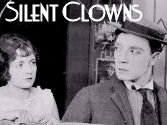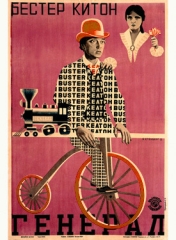SPITE MARRIAGE
(1929)With Buster Keaton, Dorothy Sebastian, Edward Earle, Leila Hyams.
Directed by Edward Sedgwick
Silent with Music and Sound Effects, Black and White
Reviewed by JB
 Buster Keaton's final
silent feature film, made as a contract player at MGM, has all
the
earmarks of Keaton attempting to fit his own brand of comedy
into
a screenplay inappropriate for his usual character. The
results are patchy, to say the least. The first half, where
pants-presser Buster attempts to impress the beautiful stage star he is
in love with, is only mildly amusing. The laughs, more like
smiles, come not so much from the material but from Keaton's
naturally ability to make even weak material palatable simply by his
presence. The story is hampered by the character of the
actress,
an unlikable vamp who eventually marries Buster out of spite (and hey!
There's our title!).
Buster Keaton's final
silent feature film, made as a contract player at MGM, has all
the
earmarks of Keaton attempting to fit his own brand of comedy
into
a screenplay inappropriate for his usual character. The
results are patchy, to say the least. The first half, where
pants-presser Buster attempts to impress the beautiful stage star he is
in love with, is only mildly amusing. The laughs, more like
smiles, come not so much from the material but from Keaton's
naturally ability to make even weak material palatable simply by his
presence. The story is hampered by the character of the
actress,
an unlikable vamp who eventually marries Buster out of spite (and hey!
There's our title!).
The film picks up a bit of steam in a nightclub scene where Mrs. Buster gets drunk on champagne and makes a fool of herself. In the followup scene, Keaton embarks on a routine which he would recreate many times over. Essentially, as in most Keaton films, the love interest becomes a prop, here literally. Attempting to get his now unconscious wife into bed for the night, Keaton finds himself unable to effectively deal with the dead weight of his drunken spouse. Although the character of the wife is unlikable, Dorothy Sebastian, the actress who plays her, proves to be a perfect Keaton foil, allowing herself to be manhandled in various embarrassing and possibly painful ways for five minutes, as Buster props her up on a chair, rolls her on (and off) the bed and essentially treats her like an overgrown rag doll. Keaton probably didn't like being in this film, but he sure loved this material, as he used it several time in his talkies and recreated it for live appearances later in life.
In the second half, Keaton, abandoned by the wife who doesn't love him, winds up as a crew member on a private yacht (don't ask). When fire breaks out, the crew and passengers abandon ship, leaving Keaton alone, except for his estranged wife (don't ask). It's not entirely plausible, but the shipboard sequences come close to vintage Keaton as the film gets. There are great stunts, lots of action and some pretty good gags, leading me to suspect that Keaton had more input in this sequence than in any other. It almost feels as if he must have said "Hey, listen, if we're stuck for an ending, why not remake THE NAVIGATOR?".
SPITE MARRIAGE, the last film released by any of the big three comedians during the silent era, is a disappointment, but influential in its own way. An early stage scene, in which Buster's bumbling ways destroy a stage play seems like a precursor to the classic ending of the Marx Brothers' A NIGHT AT THE OPERA, while Clyde Bruckman lifted the entire sequence for an episode of The Abbott and Costello Show in the fifties. One can even see bits of pantomime Lou Costello may have picked up from Keaton.
But except for the boat sequences of the film, the most interesting aspect of the film is how beautifully made it is. The acting is more realistic than the usual "stage acting" of earlier films, the camerawork fluid, the action exciting and well-paced. At the same time, the talkies were still finding their feet. Cameras were stationary, rarely moving, performers went back to stage acting, and action was limited to wherever the hidden microphone was placed. Things got a lot better very quickly in sound films, but SPITE MARRIAGE, despite being a minor Keaton comedy, is an excellent example of how sophisticated silent films had become by the time they were just about to become extinct.
And Buster along with them.
The next time movie
audiences would see Buster Keaton, he would be reduced to doing an
eccentric Egyptian dance in the talkie THE HOLLYWOOD REVIEW OF 1929.
After that, he would appear in a series of talking comedies,
many
of which were box-office successes, but most of which completely wasted
the man's talent. In light of some of those later
films, the
modest charms of SPITE MARRIAGE, Buster's last silent, is hard to hate,
even if it is hard to like.  ½ - JB
½ - JB


